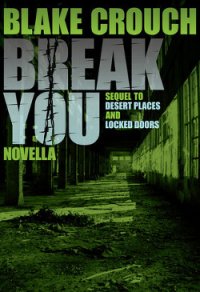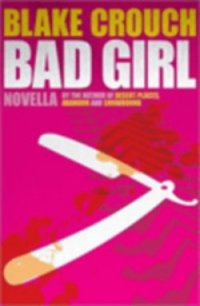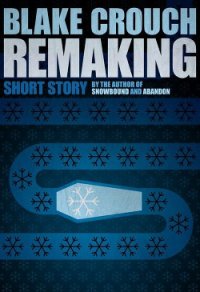Thicker Than Blood - Crouch Blake (лучшие книги онлайн TXT) 📗
The air grew damp and stagnant, fraught with the odor of must.
I entered the kitchen.
Through the windows behind the sink I could see the sound. On the breakfast table a row of grayish-blue fillets and a thin-bladed filleting knife had been left out on a cutting board beside a glass mixing bowl, half-filled with cornmeal.
Standing over the sink, I looked into the weedy backyard that sloped down to the water. There was a plot of tilled earth near the house that might’ve once been a shade garden, though nothing grew there now.
A dock stretched out into the sound. Thoroughly rotten, its collapse seemed inevitable when the next storm blew in.
Leave and come back. You should not be here like this.
I started back toward the front door.
A tiny old woman stood in the kitchen doorway.
She appeared to have just woken, her pearly mane in such extraordinary disarray it seemed to be more the result of an explosion than a nap. I could see the silhouette of her spindly frame behind the threadbare fabric of her nightgown.
Barefooted, she walked into the kitchen, opened a cabinet, took down a tin of ground coffee.
"Sleep all right?" she asked.
"Um, I uh—"
"You’re in my way. Go sit down."
I took a seat at the table as she filled the coffeepot with water from the faucet.
"Now this isn’t that fancy shit. So if you’ve turned into one of those dandies who has to have their coffee soaked and freshly ground and God knows what else, tell me now."
"Maxwell House is fine."
Mrs. Kite noticed the fillets on the cutting board.
"Goddamn him!"
She set the coffeepot down hard on the butcher block countertop and pointed at the raw fish.
"Rufus is going to ruin our lunch. You can’t leave fish out. You can’t! leave! fish! OUT!" She sighed. "Your coffee will have to wait, Luther."
Sitting down across from me at the breakfast table, she picked up one of the fillets.
"I don’t believe it," she said. "There’s no chili powder in this cornmeal. You know, I’m starting to think your father doesn’t know how to fry bluefish. And besides, you’re not supposed to fry bluefish."
She dropped the fillet and stood up. From the spice rack on the counter she plucked a small plastic bottle and returned to her chair. When she’d shaken half the bottle of chili powder into the cornmeal and stirred the mixture with her finger, she looked up at me, bewildered.
"Who are you?" she asked, a completely different person.
"My name’s Alex. Alex Young. I came here to—"
"Who let you in?"
"You did, Mrs. Kite. I knew your son, Luther, at Woodside College."
"Luther? He’s here?"
"No ma’am. I haven’t seen him in a long time. We were friends at school. Is he in Ocracoke right now? I’d really like to see him."
As the wave of lucidity engulfed her, her eyes traded confusion for sorrow. She pinched the bridge of her nose between her eyes as though her head hurt.
"I’m sorry. Sometimes my brain gets scrambled. What’s your name?"
"Alex. Do you know where—"
"And you were friends with my Luther?"
"Yes ma’am. At Woodside. I came here to see him."
"He’s not here."
"Well, do you know where he is? I’d love to—"
"I haven’t seen my son in seven years."
Her eyes blinked a dozen times in rapid succession. Then she grabbed a handful of cornmeal, sprinkled it onto a fillet, and began patting it into the meat.
She slammed her hand down on the table and my heart jumped.
"Luther, ass out of the chair, bring me a glass of water."
I got up and walked over to the sink. It overflowed with smelly dishes.
"When are you heading down to Portsmouth?" she asked as I washed a dirty glass.
"I don’t know."
I filled the glass from the tap and offered it to her.
"What’s this?" she asked.
"You asked for a glass of—"
"The hell I did. Get that out of my face." I set the glass on the counter. "If you are going down to Portsmouth today, I want you to go before it gets late. You got no business being out on the water after dark. And let me tell you another thing. I want the lodge left in immaculate condition. Your father and I are thinking of going down next weekend, and I don’t intend to spend my time cleaning up your shit."
She started on another fillet and as I watched her in the dreary natural light of the kitchen, I thought of my grandfather, Alexander, stricken with Alzheimer’s in his late 70’s. I knew the symptoms well and in the course of five minutes it had become clear to me that some form of dementia was ravaging the brain of Maxine Kite. It appalled me that she’d been left alone.
I started for the doorway.
"Where you going?" she asked.
"The bathroom. Mom."
Leaving Luther’s mother to her bluefish, I stepped out of the kitchen into the dark corridor. A door stood cracked at the end and as I walked toward it the house resumed its unnerving silence.
I could no longer hear Mrs. Kite in the kitchen or the moan of the wind outside.
At the end of the hall I pushed open the door and entered a small bookless library. A dying fire warmed the study, its barren bookshelves gray with dust.
An old and soiled American flag was displayed behind glass on one wall. It was shopworn, nearly colorless, riddled with holes made from fire, and so defiled I felt awkward and ashamed for looking at it.
On the stone above the hearth, a photograph caught my attention. It had been framed and mounted. Approaching the fire, I looked up, surprised to see that it was a photograph of the Outer Banks, taken from a satellite. I recognized the long skinny isle of Ocracoke by the harbor at its southern tip.
Of greater interest, however, was the collection of uninhabited islands a few miles south across the shallow inlet. I read their names: Casey. Sheep. Whalebone. Portsmouth.
Portsmouth. Turning away from the photograph, I felt the prickling exhilaration of discovery. But my heart stopped as my gaze fell upon the wall opposite the hearth.
The black soulless eyes of Luther stared back at me, grotesquely caricatured by the amateurish rendering. Though only a teenager in the oil painting, the vacuum in his eyes was unmistakable, a haunting prophecy of what he would become.
I hurried out of the study, crept past the kitchen where Mrs. Kite was still preparing her fish, and moved quietly through the foyer back out into the cold misty morning. Lifting the bike out of the grass, I mounted the wet seat and pedaled away between the live oaks.
35
IT started to rain on the way back to the Harper Castle—a metallic soul-icing drizzle. Riding into the parking lot, I threw down the bicycle and unlocked the trunk of the Audi. I opened the suitcase holding Orson’s journals and as I stood shivering in the steady rain, came at last across the passage that had been chewing at my subconscious for six days, since my first encounter with it at Brawley’s Self-Storage Co. in Lander, Wyoming.
When I’d finished reading over Orson’s journal entry, I tingled with relief and fear.
I could feel it in my bones.
I had found Luther Kite.
Wyoming: July 4, 1993
Independence Day. Luther and I drove down to Rock Springs this evening to drink beer at a bar called The Spigot. Met this kid named Henry, a young man about Luther’s age. Shared a few pitchers with him. Said he was working a ranch up near Pinedale for the summer. He got "tow up" as they say ‘round here. When he went to the bathroom to puke, Luther asked if we could take him home. Isn’t that cute? He thinks of the cabin as home.




